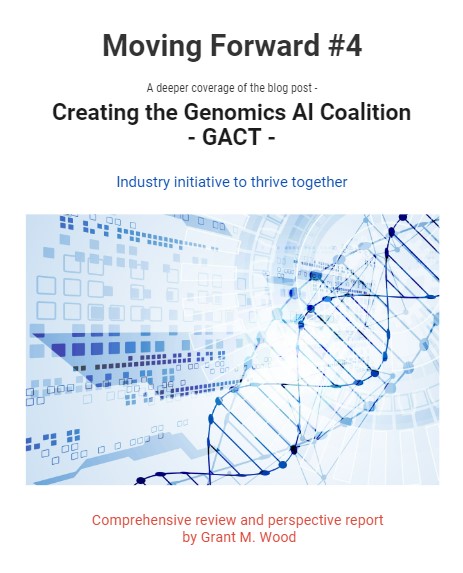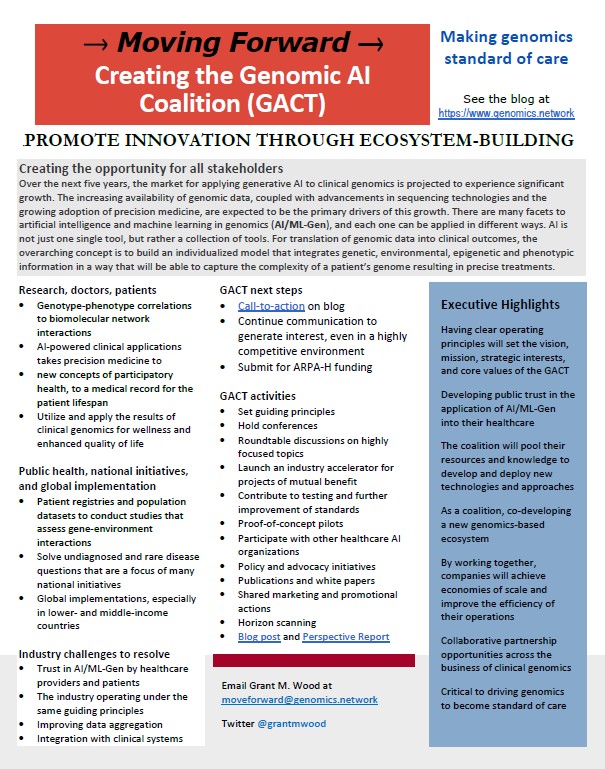Introduction
Health Level 7 (HL7) held its third annual Genomics Policy conference with a focus on Genomics and Artificial Intelligence (AI) in 2018. The conference brought together participants from various industries to discuss data interoperability from a policy perspective. As a result of the conference, the proposal for the formation of the Genomic AI Coalition (GACT) was introduced to promote innovation through ecosystem-building. The coalition aims to apply AI/ML to the research, clinical, consumer, data, public health, and national initiative worlds, and to address potential issues and challenges in each area. The global market for clinical genomics is projected to experience significant growth over the next five years, which has led to the need for an industry coalition such as GACT. Read the companion perspective report and factsheet.
Guiding principles
The perspective report begins with an initial set of guiding principles. As an industry, a set of working principles will guide the process of developing and implementing AI and machine learning through genomics-based healthcare. The General Principles of GACT are a set of clear operating principles that guide the vision, mission, strategic interests, and core values of the GACT. These principles should be an industry code of conduct, designed to avoid possible negative consequences of the misapplication of AI. We also include clinically-minded principles and those to guide continuous improvement.
Research and discovery
Artificial Intelligence and Machine Learning in Genomics (AI/ML-Gen) is expected to accelerate discovery in clinical DNA variants, gene expression, and epigenomics, leading to a new understanding of genotype-phenotype correlations. AI/ML-Gen can speed up and improve the accuracy of the data analysis process, expand the ability to analyze whole genome sequencing, and solve key clinical trial challenges. It can also help understand gene regulatory and biomolecular networks, and how genes coordinate their actions with environmental effects. Furthermore, AI/ML-Gen can be used to advance drug development, link with other medical advances, and reduce healthcare costs. However, there are still issues to overcome, including data rights and ownership, returning results to study participants, and the delay in updating public reference knowledge bases.
Clinical applications
After research, the discussion naturally leads to the benefits of AI/ML-Gen in various clinical applications. AI-based tools can enhance the process of clinical translation by covering a wide range of use cases such as disease prediction, quicker and more accurate diagnosis, and patient quality analysis, among others. AI/ML-Gen tools can also be used to extract clinically relevant information from genetic data sources to develop intelligent applications for hospitals and clinics. Clinical decision support is another major area where AI/ML-Gen can be applied, improving the utility of genetic testing and enhancing patient quality and outcomes. AI/ML-Gen can also assist genetic counselors by providing patient management, test tracking, and risk analysis tools. Lastly, the creation of the patient polyomic or molecular profile is crucial in providing optimal genomics-based care over the patient’s lifetime.
Perspective Report
A comprehensive review of this post
Factsheet Summary
A one-page summary of the post’s major issues, including executive highlights
The Call to Action
The time is now for all industry stakeholders to form a coalition to advance genomics and AI technologies in a transparent and trustworthy manner. This alliance will help establish best practices, encourage collaboration, and drive innovation. Companies involved in these fields must work together to guide the impact of this new frontier in medicine.
To participate in this effort, join us at Call-to-Action #7.
Patient applications
Working in parallel, the report discussion includes the potential benefits of incorporating AI and genomics in consumer health applications. The use of AI could provide personalized health recommendations and management by analyzing an individual’s genomic data to create tailored wellness plans. Other AI features could include risk assessment and early detection of diseases, improved patient participation and adherence, and increased efficiency in healthcare providers’ decision-making processes. Additionally, AI could aid in the creation of a patient-centered approach to healthcare delivery. However, there are issues to overcome, such as patient education, the willingness of the healthcare delivery system to partner, and the lack of a centralized data repository for a patient’s complete molecular profile.

Data aggregation
The report discusses the increasing use of personalized treatment recommendations informed by genomic data and the importance of using machine learning algorithms to take these recommendations to the next level. To achieve this, there is a need for AI/ML-Gen engines and tools to access and consume larger and more expansive data sets. GACT, through the use of data standards developed by the Global Alliance for Genomics and Health (GA4GH), proposes the creation of a federated system that would enable the linking of various data sets, including genomic, proteomic, gene expression, metabolic, transcriptome, and microbiome data, to create a patient multi-omic molecular profile. However, several issues need to be overcome, including the need for a streamlined and standardized process for getting variant data into the genomic repository and addressing data ownership and regulatory concerns. The complexity of this issue is explained in a video from the YouTube channel AI Explained.
Public health, national initiatives, global implementations
Genetic-based healthcare provides families with the opportunity to make informed reproductive decisions. It also helps diagnose genetic conditions in newborns and provides families with the necessary information to plan for their child’s future care. Risk factors such as the mother’s age, race, illnesses in siblings and other family members, and problems or loss of a previous pregnancy are used to decide which tests should be done during pregnancy to look for genetic conditions. When a genetic issue is suspected and confirmed in a newborn, it is important to coordinate care so that the infant receives treatment and the family has access to resources as the child moves through critical developmental stages.
GACT members could cover a wide range of stakeholders
- Healthcare systems and providers
- Physician specialty organizations
- Genomic sequencing labs
- Health insurance payers
- Technology, commercial developers, EHR vendors
- AI machine learning tools, population analytics tools
- Venture capital, private investors, funders
- Commercial and academic research
- Industry research like KLAS, CBInsights
- Conference organizers
- Government groups like ONC, NHGRI, ARPA-H, NIH, FDA, CMS
The GACT will promote innovation through ecosystem-building, by facilitating open discussions, symposiums, roundtables, project collaborations, demonstrations, publications, and many other activities. The following is a list of 11 activity areas for members of the GACT.
Conclusion – Opportunities for Moving Forward
AI is already enhancing the administration, treatment, and reimbursement of care in the healthcare industry. Are we currently at an inflection point in clinical genomics? And what is the definition of a turning point? By utilizing AI to analyze vast volumes of genomic data, healthcare providers and individuals can gain valuable insights into their health risks and conditions, enabling personalized recommendations, early disease detection, and enhanced treatment outcomes. The combination of artificial intelligence and clinical and consumer health applications based on genomics has the potential to completely transform healthcare.
The application of AI to genomics is anticipated to be one of the fastest-growing segments within this market, increasing at a compound annual growth rate of 44.9% to $45.2 billion by 2026. The majority of this will occur as a result of patients’ demands for more convenient, effective, and affordable healthcare. What will the world of healthcare delivery look like once these objectives are met? What happens when synthetic biology is added? How do we envision the next decade? The GACT will bring us there together in much better shape than if we go forward individually.
Contact Grant at moveforward@genomics.network.


